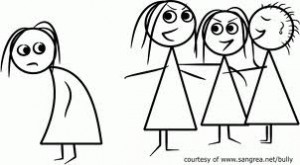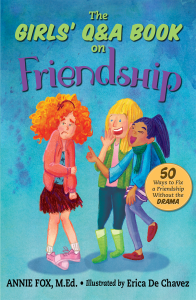“Do unto others” makes no sense to middle schoolers. (Ideally it should, but that’s not how TweenWorld currently operates.) To help our kids navigate the turbulent and toxic waters of peer relationships, we’ve got to wake up and smell the reality stinking up their world (online and off).
Of course both girls and boys have middle school friendship woes. And yes, both boys and girls can become Peer Approval Addicts. But girls often take their feelings of hurt, jealousy, betrayal and rejection to dramatic and damaging heights. So let’s talk about girl friendships.
The social garbage girls throw at each other is the stuff of rumors, gossip, harassment, and exclusion. And it often happens under the radar. Because even though a girl may be eviscerating a former bff at school and online, she still wants to think of herself as a nice girl. (I said it was twisted, didn’t I?)
I wrote The Girls’ Q&A Book on Friendship for 8-12 year olds and the adults who care about them. Let’s face it, parents are rarely aware of what’s going on on the battlefield of their daughters’ friendships. It usually comes to light when their girl feels victimized and can no longer contain her distress. At that moment she may spill the whole story of her so-called friend’s bad behavior. In response a parent might logically advise:
“Tell her how you feel about this. Tell her she’s got to stop.”
“I can’t tell her that!”
“Why not? It’s true!”
“Because it will hurt her feelings!”
“Excuse me!? You won’t tell her she’s hurt you because you don’t want to hurt her feelings?! What about your feelings?”
“Forget about it, Mom/Dad. I’m sorry I said anything. You just don’t get it.”
Bingo! Parents can’t fathom the logic here. But to the girl, the logic is clear. She will swallow her pain because she (justifiably) fears that complaining about bad treatment will cause her friend and all the others in their friendship circle to ditch the plaintiff, swiftly and completely. Our targeted daughter will be friendless and she knows it. And because that is a fate worse than death she puts up with the ongoing abuse. Pretends it doesn’t hurt. Continues to think of these girls as her friends and continues to hang out with them and be abused.
Her confusion over the love-hate/comfort-pain mix may cloud her judgment when she starts dating. If she puts up with emotional abuse in a friendship why assume she’ll choose a thoughtful caring romantic partner over one who dominates, demeans and controls?
As parents we need to help our daughters develop enough self-respect to demand respectful treatment from others, especially those closest to them. Let’s help them acknowledge the truth of what’s going on in their friendships. We won’t be able to change “mean” girl behavior in others, but we can, at the very least, help our daughters acknowledge that their pain at the hands of friends is real, undeserved and unacceptable. Then we can point out their options:
1. Stay silent. Stick with friends who hurt you and expect more of the same.
2. Talk to them about it and let them know you’re no longer giving them permission to disrespect you. If nothing changes, consider option #3.
3. Take a (permanent) vacation from the drama. Reach out to people who share your values about what it means to be a real friend.
Here’s to Real Friends vs. the Other Kind and to less friendship drama!














“Social garbage”… love it! Very nice. My blog: http://helpimparentingteens.wordpress.com/
Comment by Sara Villanueva — March 26, 2014 @ 1:50 pm